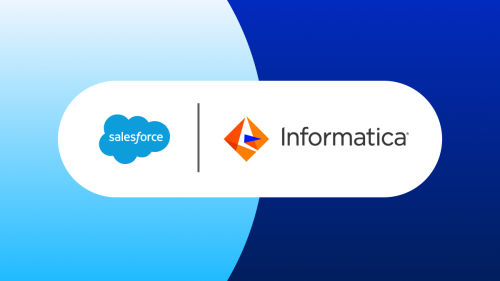Salesforce Completes Informatica Acquisition to Power a New Era of Trusted, Enterprise-Ready Agentic AI
SAN FRANCISCO, CA — November 18, 2025 — Salesforce (NYSE: CRM), the world’s leading AI CRM, announced the completion of its acquisition of Informatica, a global leader in AI-driven cloud data management. With this acquisition, Salesforce brings Informatica’s extensive capabilities — including data cataloging, integration, governance, quality and privacy management, metadata services, and Master Data Management (MDM) — directly into its platform. This unified data foundation will power safe, responsible, and scalable agentic AI across the modern enterprise.
“Getting your data right is the key to getting AI right,” said Marc Benioff, Chair and CEO of Salesforce. “Clean, connected, trusted data fuels Agentforce. Without it, there’s no intelligence — only hallucinations. Informatica transforms fragmented enterprise data into context that enables every agent to make precise decisions and deliver real outcomes. When companies fix their data, they fix their AI — and that makes Agentforce unstoppable.”
“With Informatica, we’re delivering a complete, governed data platform that drives more contextual, intelligent, and autonomous experiences within Agentforce 360,” added Steve Fisher, President and Chief Product Officer, Salesforce.
Strengthening the Agentforce 360 Platform
The acquisition enhances Salesforce across key areas:
Data 360 → More Clarity and Trust
Informatica strengthens Data 360 by ensuring enterprise data is unified, high quality, and actionable.
MuleSoft → End-to-End Integration
By combining MuleSoft’s integration leadership with Informatica’s governance and advanced data services, customers gain a comprehensive integration fabric optimized for the AI era.
Agentforce 360 → Stronger Foundation for Autonomy
The combined technologies create a trusted data and metadata backbone for autonomous AI agents to reason, act, and deliver outcomes.
Tableau → Deeper, Context-Rich Insights
A more unified data landscape enables Tableau users to unlock richer, context-driven analytics.
Salesforce also expands its metadata advantage — long a differentiator across the Salesforce ecosystem. Informatica broadens this with enterprise-wide metadata, bringing deeper context and lineage from any system, not just Salesforce. This results in more accurate, explainable, and trustworthy AI outcomes at scale.
Informatica’s Mission Accelerates Inside Salesforce
Informatica will continue executing its mission to connect, manage, and unify AI-ready data across the enterprise. It will maintain support for its ecosystem of partners while Salesforce integrates its full technology stack — including data integration, governance, unified metadata for Agentforce, and a single trusted data pipeline with MDM on Data 360.
“Joining Salesforce allows us to accelerate our position as the ‘Switzerland’ of AI-powered data management,” said Amit Walia, CEO of Informatica. “Together, we offer customers a single vendor that unites applications, trusted data, and AI agents to unlock innovation and growth.”
Financial Outlook and Upcoming Earnings
During its Dreamforce Investor Day, Salesforce shared that it expects the Informatica acquisition to be accretive to non-GAAP operating margin and EPS within 12 months — one year earlier than originally projected and consistent with Salesforce’s responsible M&A framework.
Salesforce will discuss the transaction further during its Q3 Fiscal 2026 Results Conference Call on December 3, 2025, following market close.
Forward-Looking Statements
This announcement includes forward-looking statements regarding Salesforce’s acquisition of Informatica and anticipated business impacts. These statements are based on current expectations and are subject to risks and uncertainties, including integration challenges, financial impacts, economic conditions, and other factors detailed in Salesforce’s filings with the SEC. Salesforce undertakes no obligation to update these statements unless required by law.
Use of Non-GAAP Financial Measures
The release includes non-GAAP metrics such as operating margin and EPS. These exclude non-cash items (like stock-based compensation and intangible amortization) to provide additional insight into operational performance. Non-GAAP measures should be considered supplemental to GAAP financials.

